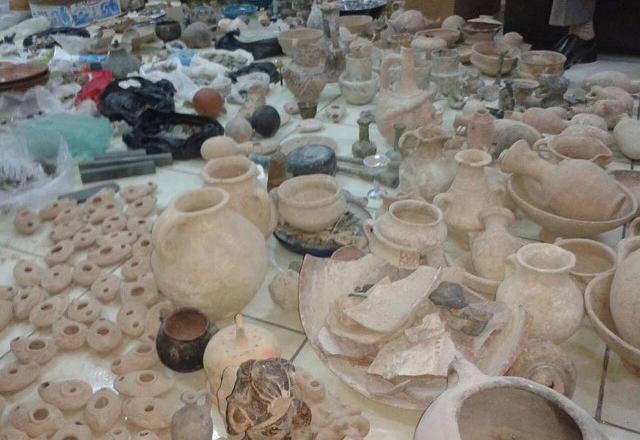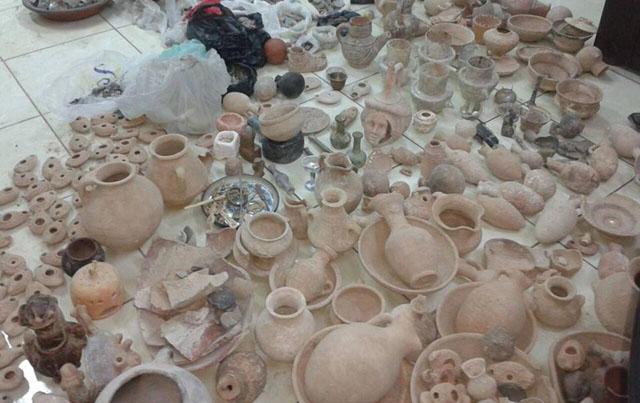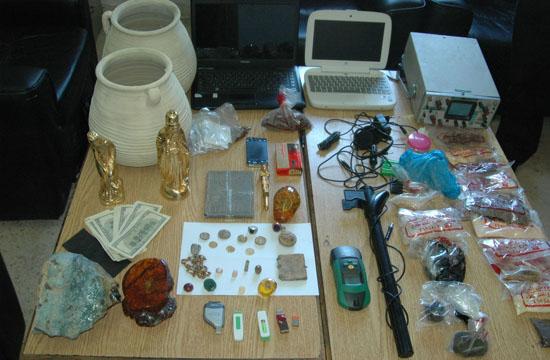You are here
Suspect arrested for attempt to sell fake, authentic artefacts
By Rana Husseini - Aug 26,2014 - Last updated at Aug 26,2014

AMMAN — Police and Department of Antiquities (DoA) personnel on Tuesday announced the arrest of a man in Jerash who reportedly attempted to sell fake and authentic artefacts believed to belong to the Byzantine, Roman and Islamic periods.
The suspect was allegedly in possession of dozens of statues, swords, pots, coins and other artefacts he planned to sell for personal gain, according to a statement issued by the Public Security Department (PSD).
“Police received a tip almost three months ago that the suspect was looking for buyers for his collection,” a senior official source said.
The suspect was monitored and arrested on Sunday while attempting to sell the items to an undercover police officer, the source told The Jordan Times.
Jerash DoA Director Ahmad Shami, who was dispatched to examine the seized pieces, said some of them were authentic while others were fake and manufactured in neighbouring countries.
“There were several valuable pieces that belong to the Roman, Islamic and Byzantine eras, while the fake antiques were made to look authentic,” he explained.
Shami told The Jordan Times that none of the artefacts were taken from any Jordanian archaeological site.
“It seems that that majority of the seized items, fake and real, were smuggled into the Kingdom from Iraq and Syria. We don't have these kinds of artefacts in Jordan,” he said.
The official added that some of the fake pieces were manufactured using ancient material “to make them look real”.
“Some of the pieces were made using ancient rocks and other material to deceive buyers who would think they were buying an ancient and valuable piece of art,” noted Shami, who started working in this field in 1987.
The DoA official added that all the seized coins that he examined were fake, while the swords were “replicas of models made during the Islamic era that can be found in the local market and in markets of other Arab countries”.
The DoA is waiting for the investigation to conclude in order to obtain the items and hand the authentic ones over to the Kingdom’s museums.
The fake pieces, he said, will remain at the DoA “to prevent the reselling or distribution of these articles in the market”.
PSD Spokesperson Maj. Amer Sartawi told The Jordan Times that an investigation is ongoing to “determine whether the suspect has other accomplices or was acting alone”.
If convicted, the perpetrator could receive between one and three years in prison for violating the Archaeology Law of 1988.
Related Articles
Police and Department of Antiquities (DoA) personnel on Thursday announced the arrest of a man in Jerash who reportedly planned to sell fake and authentic artefacts believed to belong to the Bronze and Iron ages as well as the Greek, Byzantine, Roman and Islamic periods.
Police and Department of Antiquities (DoA) personnel on Thursday announced the arrest of a man in Jerash who reportedly planned to sell fake and authentic artefacts believed to belong to the Bronze and Iron ages as well as the Greek, Byzantine, Roman and Islamic periods.
Department of Antiquities (DoA) officials on Sunday warned the public of individuals who are defrauding people by attempting to sell them fake artefacts.














